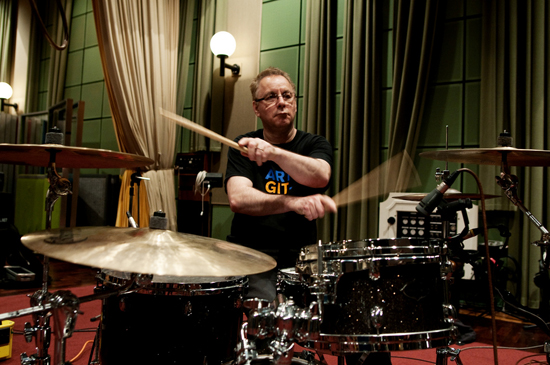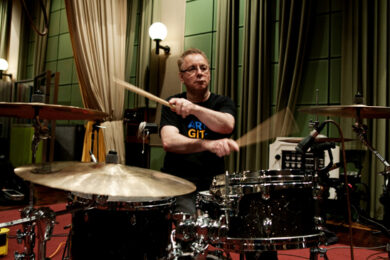Click the picture of Colin Newman drumming for a full gallery of images from the session
And so the heroes of post punk and the group for whom the term post rock was coined meet in the BBC’s Maida Vail studios for an improvised session to be broadcast on BBC 3’s ever-dependable Late Junction show. Now, the idea of a "jam" is one that generally makes the Quietus recoil in horror, but the results of the session, as heard on the preview disc the BBC kindly sent us, make for a fascinating listen. Tortoise and Newman’s identities disappear into this music. There are five tracks that start tentatively with the Wire man’s guitar riffs, before swirling into bigger pieces as the various members of Tortoise take up his introductory motif. There’s the odd trademark sound – Tortoise’s warm guitar, a fizzing motorik feel to some percurssion, guitar lines reminiscent of Wire’s later output – but they’re just moments swiftly subsumed by this freshly created whole. The Quietus got in touch with Tortoise’s Doug McCombs and Wire and Githead’s Colin Newman to find out more.
How did the idea for the collaboration come about?
Doug McCombs: The radio show contacted us about doing it. I understand that it’s an ongoing series of collabs. Out of practicality we tried to limit our choices to people who might be available or living around the London area. I remembered that Mr. Newman had mentioned once that he liked one of our records, so it seemed within the realm of possibility that he might be interested in participating.
Can you tell us a little about how you came across Colin Newman’s work for the first time?
DMC: England in the 70s seemed like a very different place from America, or maybe it was just London. I grew up in a small Illinois town and had almost no access to information about underground culture. I had no interest in rock music until I stumbled across DEVO playing on TV one night. After that, shopping at the one record store in my town consisted of trolling the "cut-out" bin for things that looked weird. The first four records I bought were Are We Not Men…, Duty Now for the Future, Marquee Moon, and Pink Flag.
And Colin, how about you and Tortoise?
Colin Newman: The mid 90s in London was all about drum ‘n’ bass. Although it seems absurd now, the scene was so all encompassing there was a point when it was really hard to imagine any other kind of music. Of course everything passes and nothing marked the passing of the drum and bass era than the way that Millions Now Living Will Never Die, Tortoise’s second album, swept the cognoscenti on it’s UK release. It was simply a record that everyone who was anyone seemed to either own or know. The same person who did press promotion for swim at that time also did that album so we got a copy pretty early on…
Wire are known for their influence on US punk rock, but were they also an inspiration in the early days of Tortoise?
DMC: Definitely. We had all been playing in bands in the 80s that had been following one evolutionary branch of the underground rock scene and with TRTS we kind of went backwards and began following another branch. I think Wire figures in both of those branches (figuratively speaking, of course. It’s more like jumping around on a bunch of criss-crossing branches and Wire is sitting there on many of them, watching).
How did you plan the session? Was it all improvised or did you go in with ideas in place?
DMC: We figured it was pointless to try to plan ahead for the session. We decided whatever we could come up with in six hours would be the session. We did it in more like four. It wasn’t improvised. We would play a little bit until we came across something that seemed good and then record it without much development.
Colin, what thoughts did you have before going into the studio?
CN: I had one conversation with John McEntire on the phone. Also Malka and I went to see them at the Garage the night before the session so we could just say hi to everyone. What I basically said was there was no way I was going to be able to keep up with their level of musicianship and that we’d best keep it simple. Everyone seemed to think that was a good plan (well the only other option would have been panic!) We came to the conclusion that if it ended up coming out like a heap of shit so be it. It would be a bit pointless to have too many expectations. We’ve all been around long enough to realise that something that looks good on paper won’t necessarily fly!
Given it’s an audio-only piece, can you set the scene? Were you swapping instruments and so on?
DMC: We were following Mr. Newman’s lead. He’d pick up an instrument and start playing. We’d then try to fill in around him. There was a fair amount of instrument swapping.
Colin, did you approach your contribution differently to how you’d work with Wire and Githead?
For me collaboration is about people, so how it works it very much down to the people involved and for it to be a genuine collaboration there needs to be the right frame for the individuals to fully contribute. Githead can really pull something out of mid air, we can definitely write on the hoof, Wire tends to need the framework of a song already having been written for band to gel around but given the same input you would get entirely different results for each band. Tortoise are players and accomplished ones at that but they like also to have a good laugh and are way less precious about what they do than anyone might imagine which is a good job because I’m a bit of a musical vandal!
What was the biggest challenge in the recording?
DMC: I guess the biggest challenge was to ignore our tendency to begin arranging things into "songs". In the interest of brevity we thought it would be better to leave the music unformed and avoid getting bogged down with arrangements.
Colin, is it strange to have the master of minimalism working with the maestros of doodle?
CN: Hahaha genius! Actually I played some of my usual moronic guitar and they all joined in. I suspect it was probably a great relief for them to just join in on something pretty basic. There was no time to be noodly about it and I can be quite direct about what I think ought to happen.. However to be honest by the time we’d done a couple of pieces we didn’t really need to talk much about it… It was all very quick, how I like t.
It’s interesting listening to the tracks that it sounds very complete – there are no obvious Newman or Tortoise moments. Did that happen naturally, and was it a surprise?
CN: The reason why I agreed to do it was because I was intrigued to see how it would work out. It’s a somewhat unlikely combination but the conditions were very good for it to work out. We were set up in a circle in the nicest (& biggest) BBC studio at Maida Vale, no headphones to contend with and we just played. What you get is the sound of them discovering me and me discovering them. I think everyone liked what they found. I would know how to pretty effectively tighten up those pieces because the basic templates are pretty good. We all felt afterwards that we’d like to do more somehow, some way. Let’s see if something more comes out of it. They are in Chicago and I’m in London and we all have plenty of other stuff to do plus the world isn’t exactly queuing up to offer us vast sums to make sublime music but I’d like to hope we can do more sometime.
Tortoise, can you recommend one track by Wire, Githead or another of Mr Newman’s projects to pass on to our readers?
DMC: This should by no means be taken as an indication that Mr. Newman’s first work was his best, but I have a particular attachment to Pink Flag. Another band I play in has played the song ‘Lowdown’ on and off for years. One of the top songs.
And finally Colin, could you recommend a piece of music by Tortoise or related projects to our readers?
CN: I’d have to say the track ‘Djed’ from Millions… is still my favourite. Like the best of all Tortoise it reaches moments of sublime beauty and amplifies the bands harmonic signature (IMO their best aspect).
Click the picture of Colin Newman drumming for a full gallery of images from the session
Colin Newman and Tortoise’s collaboration is broadcast on BBC Radio 3’s Late Junction this Thursday, October 15th, at 23.15



